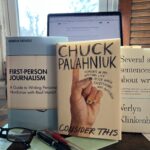I’d been working on Chapter 12 of my next novel (due out in November this year, 2023) for a few days. A bit more than a thousand words in, I wrote this sentence: “He was going to need to figure out how to deal with whatever Arthur Gold had planned, but it wouldn’t do to show his hand right there.” My brain came to a full stop. I understood I could take that sentence a whole bunch of directions. I had no idea which direction made sense. I also wasn’t sure I even liked that sentence.
I’d written about two pages (a decent amount for any morning at my desk). My brain was saying it’s time to call it quits. Something will show up tomorrow, hopefully. Maybe not. We’ll see. I wasn’t worried. However, a few years ago a shut down like that might have found me feeling incompetent or guilty or frustrated or discouraged .
Those were the days I tried to follow advice from famous writers. Here’s what Ernest Hemingway once wrote about ending work for the day:
“The best way is always to stop when you are going good and when you know what will happen next. If you do that every day when you are writing a novel, you will never be stuck.”
– Ernest Hemingway, “Monologue to the Maestro,” Esquire, October 1, 1935
The promise of completion
Hemingway’s quote is so well-known that a number of psychologists have put together numerous research projects to test it’s effectiveness. The original team of education researchers in Japan coined the term “the Hemingway effect.” I wonder, however, if they ever read that full decades old essay/story.
The research those academics concerned themselves with has very little to do with writing creatively — especially writing a novel, probably most artistic inventions in general. Their research attempts to quantify the probability of completing a task when experimental subjects were near a finishing point. The idea is that you’re more likely to have success and won’t procrastinate on tasks specifically because you have a positive perception of what you’re doing since you are almost done. Theoretically as well, it would seem, is the simple idea of the promise of completion. Getting something done, whatever it is, creates a sense of accomplishment.
That all makes sense as far as it goes and probably has a lot of value in certain venues and situations of life. Just not really in the world of creative expression — especially writing books and stories.
Lost in the creative forest
It’s rarely that simple or easy as a writer to feel confident about most projects. That initial lightbulb moment comes for a reason, but following the light given off can be a slow-motion shadow dance. We usually don’t know if the direction our words have been trudging is the right one. Sometimes there’s this feeling: “Hmm, I’m saying something completely different than I intended.” Sometimes you realize several hundred words into a project that you need to do a lot more research if you’re going to say something new and noteworthy.
Hemingway said to stop when you still know where you’re going. But losing your way may actually be the best time to stop.
Creative cognition — the imagination — is a wondrously incomprehensible thing. It doesn’t matter if you’re writing a song, welding together a miniature sculpture out of paperclips, looking to pound out a 600-word essay on the SEO frontier, or stumped in the middle of Chapter 12 of your sci-fi novel about the mystery of music. If your brain got you into the mess of a first (or fifteenth) version, it will get you out. Imaginations need time and patience. Creating anything worthy of other people’s eyes and ears should probably be a gradual discovery process anyway.
The rest of the effect
In fact, while that quote of Hemingway’s is often cited as the basis for the so-called “Hemingway effect,” he is actually more concerned in that essay with the problem of worrying about a project when it’s not being worked on. He writes, “…if you think about it consciously or worry about it you will kill it and your brain will be tired before you start.”
Hemingway wasn’t suggesting that writers stop for the day when they’re “nearing completion of a project.” The dude was a novelist. There’s rarely real completion of a novel, except when an editor takes it away and won’t let you mess around with it anymore.
Here’s Hemingway again from that same Esquire piece:
Once you are into the novel it is as cowardly to worry about whether you can go on the next day as to worry about having to go into inevitable action. You have to go on.
We definitely want to come to the table ready and willing to work every day, but we need to be prepared for some days, or weeks, where it’s hard to squeeze much out of certain projects. Often, we don’t even know why we’re having a hard time. The mind wanders out the window and over the trees into the sky. We read our thesaurus hoping to compile a list of words for “smile.” All that sputtering procrastination is part of the process. It’s one reason, it seems to me, we should always have more than one project going all the time.
Maybe our brains need to be re-directed in order to protect us from thinking too highly of our initial inspirations and sure-fire intentions. Maybe Hemingway was as worried about writer’s block as most of us are at one time or another in our writing lives.
But maybe that’s one of the real points here: there’s no such thing as writer’s block. There’s just fear of writer’s block. And fear of being one of those people who procrastinates all the time or simply doesn’t know what they’re doing. I say this though: when you don’t know what to write next, your unconscious is asking for time to work on the puzzle you’ve given it. Relax. Go read some poetry. I like ee cummings because his work tends to be so antithetical to the narrative process of novels.
Maybe, too, the rest of the Hemingway effect is that unless you know how to not worry and simply enjoy the slow-motion ride of writing projects (whether short or long), you may never complete your task appropriately. Sometimes it’s not even a matter of slow-motion, but of standing still and waiting.
No question, writing stuff that’s good enough for others to read is often going to be a struggle. But if you’re not struggling some with creativity, are you really being that creative?
• • •
Note: This article was originally published in The Writing Cooperative publication on Medium.com in July of 2022. You can check it out and other posts I’ve made to various Medium publications here.

